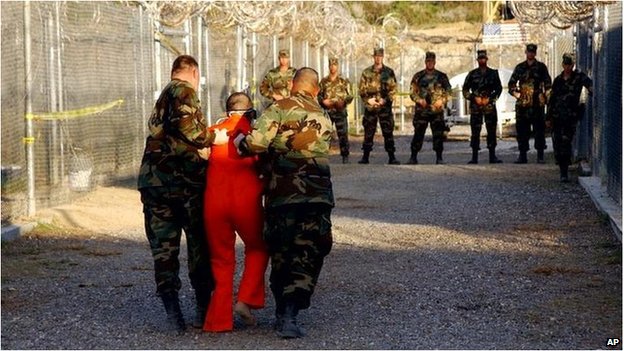
BBC Online: None of the redactions from a CIA report on interrogation related to British involvement in the mistreatment of prisoners, Number 10 has said. Downing Street confirmed UK and US intelligence agencies discussed the controversial report before it was published. But a spokesman insisted any redactions would have been made on “national security grounds”. The report found “brutal” treatment of al-Qaeda suspects in the wake of 9/11. Senators looked at how the CIA handled detainees in the years after the World Trade Center attacks in 2001. The full document, produced by Democrats on the Senate Intelligence Committee, remains classified. The published report contains no reference to UK agencies. Home Secretary Theresa May is expected to be questioned by MPs on Monday about a meeting she held with the committee in 2011. Downing Street said Mrs May “discussed a range of issues” at the meeting. Dianne Feinstein, chair of the Senate committee, said CIA tactics – which included repeated waterboarding, slapping, stress positions and sleep deprivation – amounted to torture. ‘Protect sources’ A version of the report was finished in 2012, but there were disagreements about what should be published. Part of this process was a “classification review” by the CIA into what information should remain classified. Downing Street said UK requests for redactions were made “agency to agency” – by British intelligence service MI6 to the CIA. The requests were made to protect sources and for other national security reasons, No 10 added. On Wednesday, Downing Street said no requests for redactions had been made. BBC security correspondent Frank Gardner said a Whitehall official “pointed out” it would make no sense for the CIA to redact allegations of UK abuse while allowing its own name to be “dragged through the mud” in the Senate report. US report’s key findings: * none of 20 cases of counterterrorism “successes” led to unique or otherwise unavailable intelligence * CIA misled politicians and publicat least 26 of 119 known detainees in custody during the programme wrongfully hel * dmethods included sleep deprivation for up to 180 hours, often standing or in painful positions * Saudi al-Qaeda suspect Abu Zubaydah was kept confined in a coffin-sized box for hours on end waterboarding and “rectal hydration” were physically harmful to prisoners. As well as meetings between UK and US intelligence agencies, information obtained by human rights charity Reprieve in August suggested UK government officials had met members of the Senate Intelligence Committee on 24 occasions over the previous five years. The charity has requested details of the subjects discussed but says it has yet to receive a response. William Hague – then foreign secretary – said in July: “The UK government has not sought to influence the content of the Senate report. “We have made representations to seek assurance that ordinary procedures for clearance of UK material will be followed in the event that UK material provided to the Senate committee were to be disclosed.” Government ministers and UK security and intelligence agencies MI5 and MI6 have always said torture would never be used by Britain to extract information. Parliament’s Intelligence and Security Committee is currently examining the question of whether the UK was complicit in the US mistreatment of suspects. On Thursday, Deputy Prime Minister Nick Clegg said he would be open to a full judicial inquiry if the committee failed to answer key questions.

